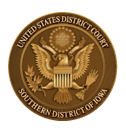UNITED STATES DISTRICT COURT
SOUTHERN DISTRICT OF IOWA
Attorney Admission Fund Plan
Amending Plan of September 19, 2019
Effective August 13, 2024
The Southern District of Iowa maintains an Attorney Admission Fund ("Fund'') for the use and benefit of the bar and bench in the administration of justice. This Plan for administering and operating the Fund is adopted by the Court in conformance with the Guide to Judiciary Policy, Volume 4, Chapter 6, and Local Rule 83 b and c 3.
I. Advisory Committee
An Advisory Committee shall provide advice and guidance to the Chief Judge on appropriate expenditures from the Fund. The Advisory Committee consists of the Active District Judges, the Chief Magistrate Judge, a member of the Federal Practice Committee of the Iowa State Bar Association, a member of the Federal Bar Association, such other members of the Southern District of Iowa Bar as deemed appropriate by the Chief Judge, and the Clerk of Court. The attorney members shall be appointed by the Chief Judge, serving three-year terms, with the option to be reappointed for an additional three year term in the discretion of the Chief Judge. The Advisory Committee is the trustee of the Fund tasked with administration and operation of the Fund in compliance with the requirements of the Guide and Local Rule 83 b and c 3. The Advisory Committee may conduct its meetings by telephone, email, or in person.
II. Custodian
The Clerk of Court serves as the Custodian. The Custodian supervises the receipt, deposit and disbursement for all fees maintained in the Fund. The Custodian is charged with effecting all audits and accountings and for carrying out all responsibilities tasked by the Guide or by the Advisory Committee in accordance with the law, this Plan, and the policies established by the Court.
III. Funds
Funds collected under the authority of this Plan must be deposited in the Court's Deposit Fund and posted in the Treasury Control Account ledger maintained by the Court. Not less than once each fiscal quarter, the Custodian will cause fees to be transferred from the Court's Deposit Fund to the Attorney Admission Fund. Whenever practical and feasible funds will be invested in interest-bearing accounts, money market funds or government obligations. The Fund must be segregated from all other monies in the custody of the Court.
IV. Disbursement of Funds
The Fund may be used only for purposes to benefit the bar and bench in the administration of justice. The Fund must not be used for any purposes for which appropriated funds may be legally used, even if the appropriated funds are exhausted or otherwise not available, or to supplement the salary of any court officer or employee. Magistrate Judges may order expenditures for pro bono or prisoner civil rights case appointments. All other expenditures must be approved by the Chief Judge, an Active District Judge, or a Senior District Judge maintaining a full caseload. Expenditures exceeding $1,000 must also be reviewed by the full Advisory Committee. The Custodian and/or delegated disbursing officers will issue payment upon presentation of an order signed by a designated judicial officer and appropriate documentation demonstrating that the expenditure meets applicable guidelines. Expenditures over $1,000 related to a pro bono or Prisoner Civil Rights Case appointment (Items 6 and 8 below) are exempt from the Advisory Committee review requirement, as they are more appropriately approved by the presiding judge. Examples of proper uses of the Fund include, but are not limited to:
- Attorney admission proceedings;
- Attorney discipline proceedings;
- Lawyer lounge facilities, other than construction or build-out expenses;
- Fees for services rendered by independent Fund auditors;
- Judicial investitures and ceremonies for expenditures not permissible from appropriated funds, if members of the bar are in attendance;
- Compensation and expenses for attorneys appointed by the Court to represent indigent civil litigants;
- Litigation expenses of civil litigants permitted to proceed in forma pauperis;
- Compensation up to $5,000 per case and expenses of representation of inmates in some prisoner civil rights cases;
- District Historical Society Projects;
- Federal Practice Committee Projects;
- Continuing Legal Education Seminars for the bar;
- Expenses related to visiting dignitaries, such as gifts or meals;
- Educational programs given by or supported by the Court, excluding educational programs for court officers and employees, or educational programs supported by appropriations, such as CM/ECF attorney training;
- Refreshments for CM/ECF training to the public; and
- Expenses incurred by a juror, causing undue hardship, solely because of jury service (e.g. parking tickets).
V. Audits
The Custodian must conduct, at a minimum, an annual audit and accounting of the Fund. In addition to the audits and accounting mandated by the Guide, an exit audit must be conducted at the time a successor Custodian is appointed. The departing Custodian must sign the final report of the exit audit. The successor Custodian must execute a receipt acknowledging transfer of the Fund. This Attorney Admission Fund Plan amends and supersedes the Attorney Admission Fund Plan adopted on September 19, 2019.
VI. Accumulation of Funds
The Custodian will notify the Chief Judge if the fund’s balance reaches $500,000. The Chief Judge will evaluate the court’s current and future needs to determine if the court should reduce or eliminate the local fee collections.
Attorney Admission Fund Committee Members
| Chief Judge Stephanie Rose |
| Judge Rebecca Goodgame Ebinger |
| Judge Stephen Locher |
| Chief Magistrate Judge Stephen Jackson, Jr. |
| Attorney Gina Messamer |
| Attorney Jacob Bylund |
| Clerk of Court John Courter |
